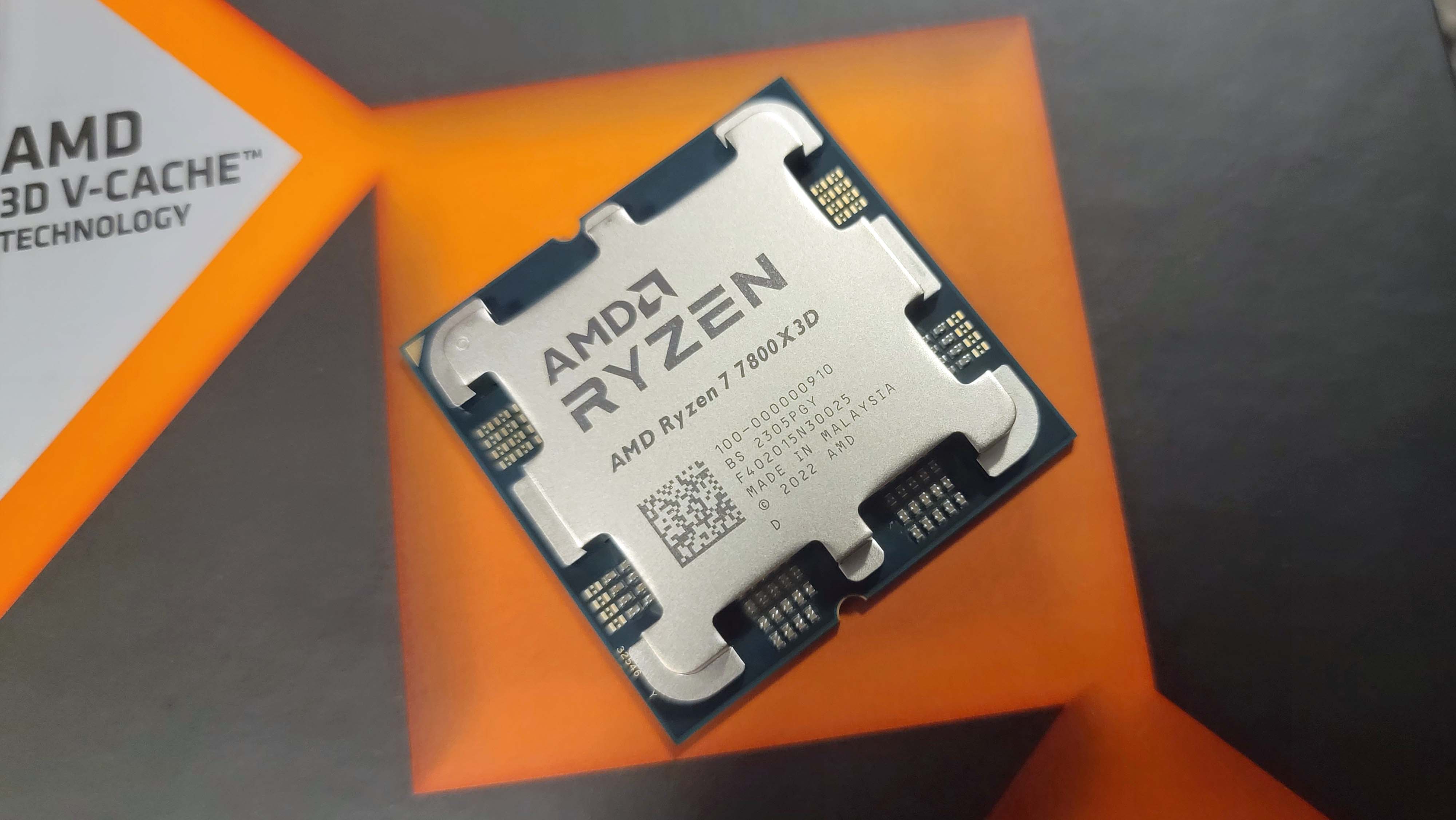Why you can trust Tom's Hardware
AMD Ryzen 7 7800X3D Boost Frequencies, Voltages, and Thermal Benchmarks
AMD's 3D V-Cache tech requires special accommodations to manage voltages and, thus, thermals. This is because of the silicon shim stacked atop the CPU cores on the chiplet with 3D V-Cache — this shim transfers heat from the cores to the integrated heat spreader (IHS) but inevitably reduces the efficiency of the thermal transfer from the cores. In effect, the shim traps a small amount of heat. As such, AMD limits the 3D V-Cache CCD chiplet to ~1.1V to keep heat within safe boundaries.
We put the Ryzen 7 7800X3D to the test to compare to the measurements we pulled from the Ryzen 9 7950X3D, and also to gauge thermal output and peak clock rates.
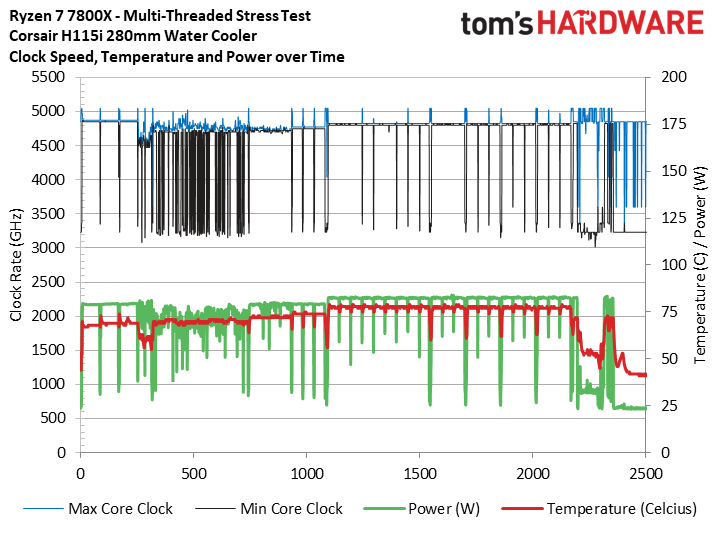
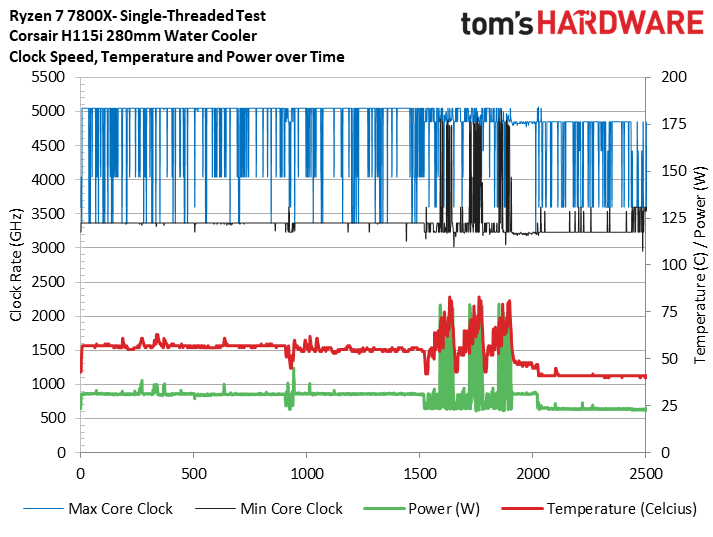
As you can see in the images above, we ran through a spate of standard heavily threaded applications (Cinebench, HandBrake, AVX-heavy y-cruncher) to measure power and thermals in multi-threaded work, and then another series of lightly-threaded apps to check performance in lighter fare.
Tom's Hardware | Single-Threaded Peak | Multi-Threaded Sustained | nT Power | Voltage (peak) |
Ryzen 7 7800X3D (3D V-Cache) | 5.05 GHz | 4.8 GHz | 84W | 1.136 |
7950X3D CCD 0 (3D V-Cache) | 5.25 GHz | 4.85 GHz | 86W | 1.152 |
7950X3D CCD 1 (No extra cache) | 5.75 GHz | 5.3 GHz | 140W | 1.384 |
The tests allowed us to generate this table with the frequencies and voltages for the Ryzen 7 7800X3D, which we can then compare to the two compute chiplets (CCDs) present on the Ryzen 9 7950X3D. As a reminder, the 7950X3D has both a bare chiplet and one with the 3D V-Cache. You can see our in-depth testing of the 7950X3D's chiplets here. We use those numbers as a comparison point in the above table.
The 7800X3D easily reaches its rated 5.0 GHz clock rate in single-threaded work, which is 200 MHz lower than the 7950X3D's similar chiplet. This means that AMD could have likely assigned an extra 200 MHz to the 7800X3D's boost clock rates, but probably held back for the sake of segmentation — the 7800X3D already slightly beats the 7950X3D in gaming, and it would be a bad look if it beat the more expensive chip by even larger margins. We can also see that the 7800X3D achieves nearly the same ~4.8 GHz clock rate in threaded work as the cache-equipped Ryzen 9 7950X3D chiplet.
| Header Cell - Column 0 | 65W TDP | 105W TDP | 120W TDP (X3D) | 170W TDP |
|---|---|---|---|---|
Socket Power (PPT) Watts | 88W | 142W | 162W | 230W |
Peak Current (EDC) Amps | 150A | 170A | 180A | 225A |
Sustained Current (TDC) Amps | 75A | 110A | 120A | 160A |
The Ryzen 7 7800X3D also pulls nearly the same 88W of power as the cache-equipped chiplet on the 7950X3D, suggesting that this chip might've benefitted from a lower TDP assignment. Overall, the Ryzen 7 7800X3D appears to fall into the standard 65W profile that specs a maximum of 88W of power consumption (PPT). Given our measurements, the Ryzen 7 7800X3D's 120W TDP rating seems far overprovisioned.
The Ryzen 7 7800X3D is exceptionally easy to cool even during these heavily-threaded tasks — the chip never exceeded 79C, but that is with the fans cranking away at full speed. We don't think most users will run into any serious problems cooling the Ryzen 7 7800X3D if they use the recommended 280mm or greater cooler.
Ryzen 7 7800X3D Benchmark Test Anomaly and Solution
We ran into a serious performance anomaly that went undetected until late in our review process, but we devised a workaround that allows the Ryzen 7 7800X3D to operate correctly.
The Ryzen 7 7800X3D comes with a single compute chiplet, so unlike the dual-chiplet 7950X3D and 7900X3D, it doesn't require special software handling to operate normally. However, as AMD listed in the reviewer guide, the changes that AMD's original chipset driver makes to Windows for the 7950X3D/7900X3D chips can't be completely reversed, which is almost unbelievable.
AMD says the issue is with the PPM Provisioning File component that's part of the AM5 chipset drivers, and this condition exists with the publicly available chipset drivers for the X3D chips. In fact, AMD's guidance says that any Windows install with those drivers paired with the X3D chips can't be used with the 7800X3D, and reviewers needed a completely fresh Windows install to avoid an issue. This condition should only occur when moving from a 7950X3D or 7900X3D to a 7800X3D, so it shouldn't impact most users.
But a fresh install didn't work correctly for us — our system consistently ran slower than expected in our gaming benchmarks due to the cores continuously parking. The problem stems from AMD's special accommodations for the multi-compute-chiplet X3D processors. It's important to know that the 7950X3D and 7900X3D need thread targeting to work correctly. So, four different components work together to automatically alter the thread assignments into the cores and activate and deactivate cores strategically to boost performance — and that technique works great on the multi-compute-chiplet processors.
The PPM provisioning file driver is one of those four components, and it is responsible for adjusting the power profiles that govern parking the slowest cores when you're playing a game. For a dual-chiplet processor, this completely shuts down (parks) the cores on the ‘standard’ CCD to keep certain latency-sensitive workloads (like games) on the 3D V-Cache chiplet, thus keeping performance snappy.
That core-parking technique isn't needed for the 7800X3D because it only has a single compute chiplet. However, the PPM file provisioning driver is still needed for other purposes, so it's still installed as part of the chipset driver package. Unfortunately, due to an apparent bug in the chipset driver provided by AMD (or perhaps an enumeration issue with our test motherboard), this package enabled core parking on our test system even after a fresh Windows install, thus resulting in noticeably lower performance in several game titles.
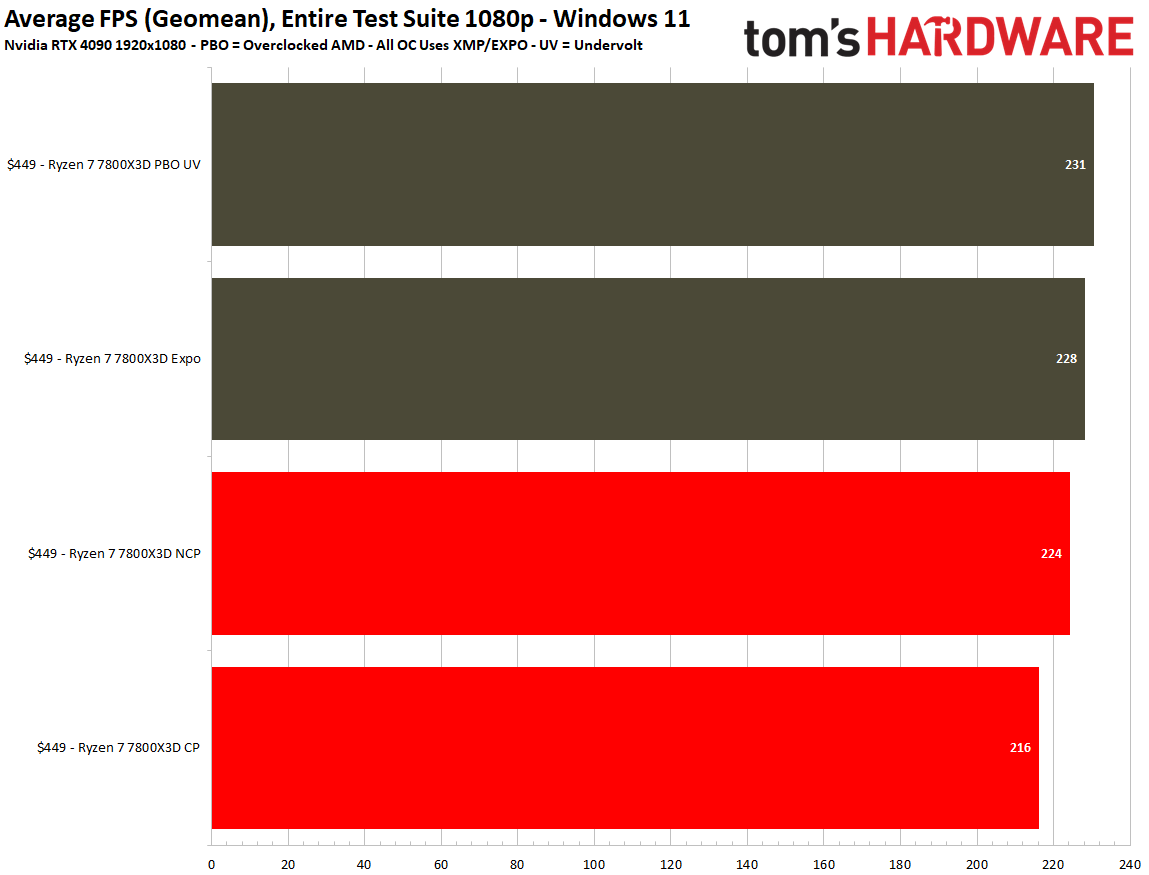
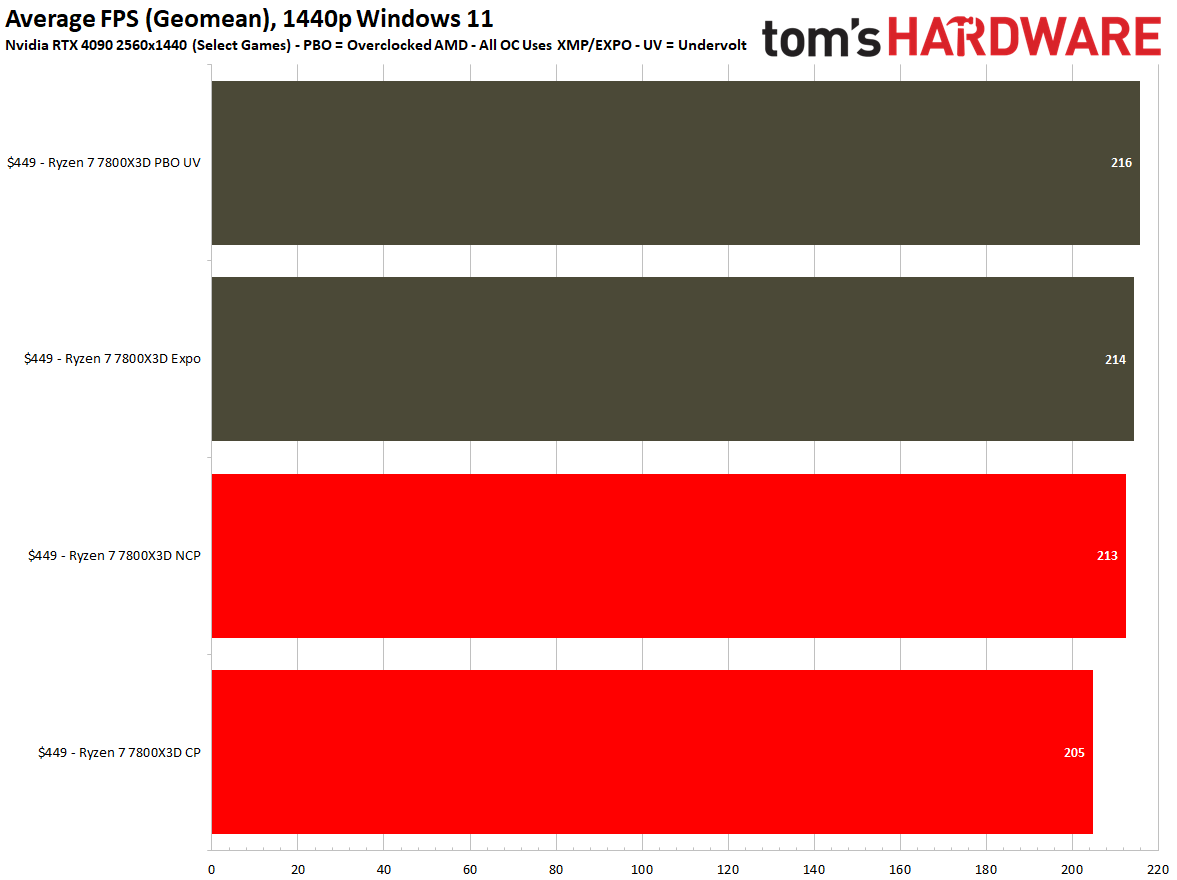
AMD is looking into the issue, and we learned that the Ryzen 7 7800X3D's cores should never park. Unfortunately, that isn't spelled out in the reviewer guide, and our cores were parking during gaming on a fresh Windows install. Luckily we noticed this as the source of the performance issues, but we haven't had time to verify it on other motherboards due to the late discovery.
Get Tom's Hardware's best news and in-depth reviews, straight to your inbox.
AMD hasn't provided an update yet, but in the meantime, we figured out how to correct the issue by disabling core parking entirely. We don't recommend that you try this at home, though. (Proceed at your own risk.)
Above, you can see how this workaround looks with the average of performance over our entire test suite. With core parking disabled entirely (listed as 'NCP'), we saw the overall average improve by 4%. That doesn't look like much when viewed in a vacuum, but it can be the difference between a winner or loser in our final results — as you'll see on the following page, this extra bit of performance puts the Ryzen 7 7800X3D ahead of the Ryzen 9 7950X3D in gaming.
Additionally, some games are more impacted than others — Far Cry 6 was 16.9% faster with core parking correctly disabled, and Warhammer 3 was 7.4% faster.
Luckily, your odds of encountering this issue are low, but be aware that you should monitor your system at first to see if the cores park occasionally (note - core parking is different than an idle state, which the cores should be able to do). You can use the CPU pane in the Windows resource monitor to check the cores.
We'll update you if we learn more about the source of our issue. We'll also retest once we get a solution to the issue, but we're told that our solution should accurately represent standard performance with a correctly installed driver. Our numbers also line up with AMD's projections, and our boost testing on the previous page assures the chip is operating correctly. As such, we've used our workaround to generate our test results on the following pages.
(Update 4/16/2023: These chips are now at retail for roughly two weeks, but we haven't heard of any reports of this issue, which is a positive sign.)
- MORE: AMD Ryzen 7 7800X3D vs Intel Core i9-13900K vs Core i7-13700K
- MORE: Best CPU for gaming
- MORE: CPU Benchmark Hierarchy
- MORE: Intel vs AMD
- MORE: How to Overclock a CPU
Current page: AMD Ryzen 7 7800X3D: Boost Frequencies, Thermal Benchmarks, Voltages, and Core Parking Problems
Prev Page AMD Ryzen 7 7800X3D: Power Consumption, Efficiency, Test Setup, and Overclocking Next Page AMD Ryzen 7 7800X3D Gaming Benchmarks
Paul Alcorn is the Editor-in-Chief for Tom's Hardware US. He also writes news and reviews on CPUs, storage, and enterprise hardware.
